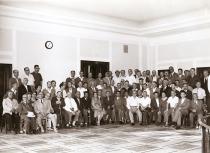Jakub Fischbein in Tashkent during WWII
This is my father in Tashkent [today Uzbekistan] in 1942 or 1943, where we found ourselves after the evacuation from West Ukraine in 1941. I think my father needed a photo for some document. I don?t know who took this picture. My father doesn?t look good here, because it was taken soon after he had been very sick.
When the war started in June 1941, we left Stanislavow. My father had the opportunity to send my grandparents with us and begged them to go; places on a train were very hard to get. But they flatly refused. So the three of us left: my mom, me and my tiny baby sister, who was born in March 1940. My father stayed behind and then followed and tried to catch up with us. I was placed in charge, that is, my father said, ?Remember that until you reach the Polish border, your mother will want to get off every time the train stops. Give her the suitcases but keep the baby. Leave it at that; if she insists, let her get off, but you and the baby must go on.?
We ended up somewhere in Kazakhstan [then a republic of the Soviet Union in Central Asia] for about two or three months, in a village where Kazakh was the only language you could communicate in. There were no houses there, only yurts. My father engaged in some superhuman efforts over there; he even left us there for a while and somehow managed to get to Tashkent. He decided that would be a good place to take us. So we ended up in Tashkent, where the population multiplied fast, because everybody was escaping as deep into the Soviet Union as they could, at this point into Asia.
Initially, in Tashkent, my dad was a porter at the railway station. Later, in Lunaczarsk, since he knew how to sharpen a razor on a belt, he got a job as a barber in the military hospital for the soldiers evacuated deep East. There was a psychiatric ward at that hospital I was very afraid of; the war gathers a rich harvest of mental diseases. I don?t know whether he got references or took advantage of his acquaintance with the staff of the hospital where he was the barber, but later, when we were back in Tashkent, he got a job in the storage room of a military canteen. His job was to move boxes and take crates, sacks and other heavy things off the trucks. My mother, when she decided it's safe to leave my sister in my care, went to help him.
There were many Poles in Tashkent, but I hardly knew anyone. My father must have made contacts with the ZPP, Union of Polish Patriots, already there. There may have been a Polish orphanage there. I was told there was a Polish school somewhere at the other side of the city. If there had been, it didn't last long; when the Anders? Army was formed, those who joined it left with their entire families.
We came back to Poland in the summer, June or July, of 1946.



















